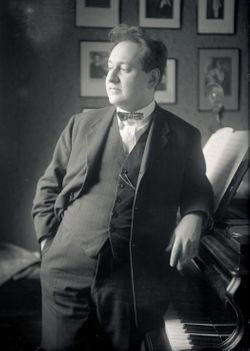
[ad_1]
Korngold and others, 2023
This Week in Classical Music: Might 29, 2023. Warmly, however with out a lot enthusiasm. Erich Wolfgang Korngold was born on today in 1897. A toddler prodigy, he had an enchanting, and in  some ways troublesome life that spanned a number of epochs. He was born in Brünn, Austria-Hungary, now Brno, the Czech Republic, on the finish of the Empire’s culturally sensible period, which was open sufficient to permit the assimilated Jews to flourish. A toddler prodigy, he was a darling of Vienna, the place the household moved when Erich was 4. His father, Julius Korngold, was essentially the most outstanding music critic of the time, working for the newspaper Neue Freie Presse, the New York Occasions of Vienna. Erich’s first piano sonata was composed on the age of 11; one other piano and a violin sonata adopted shortly after, then a Sinfonietta and a few quick operas. World Conflict I ended with the disappearance of Austria-Hungary, and Vienna, the capital of a world energy and a cultural middle of the world changed into a provincial Center-European metropolis. Korngold, by then in his early 20s, turned to the opera. Die Tote Stadt (The Lifeless Metropolis), composed in 1920 when Korngold was 23, was an amazing success and staged throughout Germany, then Europe, even reaching the Met two years later. Within the meantime, Korngold turned to writing and arranging operettas. They had been highly regarded and introduced in fairly a bit of cash. His father, whose idol was Gustav Mahler and who didn’t care a lot for operettas, wasn’t happy, contemplating this a waste of his son’s expertise. Looking back, the strategy of writing lighter music with plenty of phrases thrown in grew to become an asset when Erich earned cash in Hollywood writing music scores some years later.
some ways troublesome life that spanned a number of epochs. He was born in Brünn, Austria-Hungary, now Brno, the Czech Republic, on the finish of the Empire’s culturally sensible period, which was open sufficient to permit the assimilated Jews to flourish. A toddler prodigy, he was a darling of Vienna, the place the household moved when Erich was 4. His father, Julius Korngold, was essentially the most outstanding music critic of the time, working for the newspaper Neue Freie Presse, the New York Occasions of Vienna. Erich’s first piano sonata was composed on the age of 11; one other piano and a violin sonata adopted shortly after, then a Sinfonietta and a few quick operas. World Conflict I ended with the disappearance of Austria-Hungary, and Vienna, the capital of a world energy and a cultural middle of the world changed into a provincial Center-European metropolis. Korngold, by then in his early 20s, turned to the opera. Die Tote Stadt (The Lifeless Metropolis), composed in 1920 when Korngold was 23, was an amazing success and staged throughout Germany, then Europe, even reaching the Met two years later. Within the meantime, Korngold turned to writing and arranging operettas. They had been highly regarded and introduced in fairly a bit of cash. His father, whose idol was Gustav Mahler and who didn’t care a lot for operettas, wasn’t happy, contemplating this a waste of his son’s expertise. Looking back, the strategy of writing lighter music with plenty of phrases thrown in grew to become an asset when Erich earned cash in Hollywood writing music scores some years later.
In 1933 the Nazis got here to energy in Germany and banned Korngold’s music in that nation (after the Anschluss, it will be banned in Austria too). In 1934, an invite from Max Reinhardt, the well-known German theater director, who was then working in New York theaters and making an attempt his hand at movie, introduced Korngold to Hollywood. No one within the US was a lot taken with Korngold’s extra “severe” music however his profession within the films took off. He wrote music for a number of the hottest movies of the Nineteen Thirties, equivalent to Captain Blood, The Adventures of Robin Hood, and lots of others, singlehandedly creating a brand new musical style. He did write some “severe” music as nicely, however not a lot of it: the Violin Concerto in 1945 and a large-scale symphony in 1947, which used themes from his 1939 movie The Non-public Lives of Elizabeth and Essex. These works are romantic, flowery, and fairly, however they sound relatively dated – and, not surprisingly, remind certainly one of his movie music. We’re afraid that we agree with Julius Korngold that Erich, with all his apparent abilities and great promise, didn’t go “deep” sufficient. However perhaps it was simply inherently not in his nature: in the event you hearken to his Sinfonietta, composed when Erich was 16, you’ll be able to already hear the theatricality of Robin Hood.
Marin Marais was born on June 1st of 1653 in Paris. A scholar of Jean-Baptiste Lully, he grew to become well-known after the movie Tous les matins du monde, that includes his music, premiered in 1991. We discover most of it repetitive and never very imaginative (one way or the other the repetitious phrases within the music of Padre Antonio Soler work a lot better).
Mikhail Glinka, additionally born on June 1st however in 1804, is broadly thought-about the daddy of Russian classical music and to that extent, is essential. And Edward Elgar was born on June 2nd of 1857. He’s probably the most vital English composers of the fashionable period, however we’ve already confessed to being relatively cool to his music, the Cello concerto within the interpretation of Jacqueline du Pré however.
[ad_2]